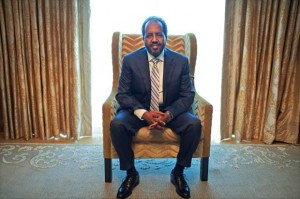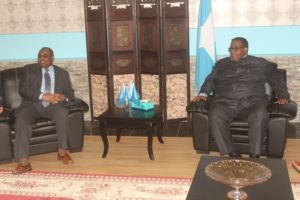By Faisal Roble
Hassan Abukar’s momentous article, “Hassan Sheik: The Return of the Incumbent,” ruffles feathers but gives good news to the incumbent Hassan Sheikh Mohamoud. Only days before the election, Mr. Abukar highlights four pertinent reasons to substantiate why the incumbent will return to power, and why any candidates hailing from the “Darod clan” family stands no chance of winning the presidency.
In passing, Hassan Sheikh is equally a fortified challenger to all of the candidates even if they hail from the same clan family as he does.
The power of incumbency, weak and disorganized opposition that does not have a common vision beyond a disparate crusade to replace Hassan Sheikh, Mogadishu city’s influence on Somalia’s current political dispensation which undoubtedly favors locals, coupled by huge corruption money that Hassan Sheikh “stashed” are key factors Mr. Abukar enumerated. He also cited how in the end foreign benefactors of Somalia will line up to side with the incumbent.

There is little to disagree with Abukar’s opinion and his prognosis that it is an uphill battle for those candidates who are members of the “Darod” clan family, particularly so much for Omar Abdi Rashid Sharmarke. Of the approximately ten candidates who hail from this particular clan family, Sharmarke seems to be one of the weaker candidates due to several factors, mostly his personal behavior as a Prime Minister in two occasions.
Although I mostly agree with Abukar’s prognosis of the slim chance for a Darod winner, simply looking at the immediate factors that lend hand to the incumbent may blind us to some of the underlying historical and political factors that brought us here. There is always a background story buried in the past to explain our current predicament.
Arnold Toynbee, one of the most influential 20th century historian, once said: History is a vision of God’s creation on the move. The fact that a Darod member may not have a “China man’s chance” to win the presidency in 2016 goes back to the 1991civil war and its aftermath. .
Some may say Sharmarke is not strong enough of a candidate to stop Hassan Sheikh. While that is true, it in itself does not explain why the incumbent president has a better chance than Omar Sharmarke or others like him. It is mainly because there are underlying weighty and corrosive historical factors that had reshaped Somalia’s post-civil political power.
The civil war of 1991 is the main culprit. In an article that I posted about three years ago, I argued that the post-civil war realty characterized by an unequal access to Somalia’s presidential post has roots in who won versus who lost the war.
Somalia’s history has been reoriented and is moved to a direction where access to the presidency by most Somalis is prohibitively narrowed, while the same civil disproportionately increased political browse of Hassan Sheikh Mohamoud and his ilk.
At least anecdotal facts bear out that thesis. For example, with the exception of the late Abullahi Yusuf, who only stayed in office for about 3 years of his full term, five of the six post-civil war presidents came from Mogadishu neighborhoods. This is to say that Omar Sharmarke has less than 15 percent chance of becoming the next president of Somalia as opposed to Hassan’s whopping 85 percent.
The decline in status of Puntland regional government is a major contributing factor to the disequilibrium of power sharing or equitable access to the presidential post. A region once viewed to be the leader or guarantor of the new federalist Somalia fumbled and now seems to have gone stray or sterile.

Following are some of the factors that had helped wither Puntland’s status. It erroneously conceded on major provisions of the federal constitution to its detriment; it was, until recently, plagued by a sectarian conflict in the east; regaining or “liberating Lasacanood” remains a pipedream. All these plus other factors in the realm of corruption plummeted public thrust. In short, Puntland has less stature today in the mission to reimagine a new Somalia.
Gone are days, it seems, when Garowe showed signs of becoming an alternative political center to Mogadishu. However that dream steadfastly died in recent years. Adding insult to an injury, Omar Sharmarke’s tenure as a Prime Minister disempowered Puntlander because of his extraordinarily ineffective role in Villa Somalia.
On the contrary, Mogadishu has flexed its muscle much more in recent years and effectively amassed more power under the leadership of Hassan Sheikh.
Despite the draft constitution calling for a negotiated settlement on the status of the capital, Somalis are denied of any open discussion on the matter. If so, Hassan abused Mogadishu’s status as the nation’s capital and milked all the benefits that come with said status to his political objectives. This in total contravention of the federal arrangement agreed upon.
The federalist concept involves multiple centers of power and equitable distribution of resources, national institutions and uniform legal instruments to ensure unity with diversity. Instead of strengthening and rebuilding their regions, most of the elites from the periphery regions rushed back to Mogadishu as soon as AMISOM restored a modicum of peace and stability. By de facto, though, Hassan Sheikh inadvertently abandoned the initial motto of federalism which stipulated the rebuilding of the country from bottom up.
If the telltale signs of electioneering, including but not limited to the influence of money in vote buying, the role of Mogadishu as the main theater for horse trading in the selection of the president, and the complete monopolization of state infrastructure such as the media, are any indications, Hassan could emerge the winner of this election.
There could also be one remote scenario where someone else can beat the incumbent. That scenario would require that all the opposition candidates back one single strong candidate after the second round so that Hassan’s ability to buy votes would be significantly curtailed. That candidate should be anyone who gets the largest number of votes among the crowded field of opposition individuals. It ain’t over until Eddo Macaan sings.
Faisal Roble
Email: [email protected]
—
Faisal Roble, a writer, political analyst and a former Editor-in-Chief of WardheerNews, is mainly interested in the Horn of Africa region. He is currently the Principal Planner for the City of Los Angeles in charge of Master Planning, Economic Development and Project Implementation Division.
We welcome the submission of all articles for possible publication on WardheerNews.com. WardheerNews will only consider articles sent exclusively. Please email your article today . Opinions expressed in this article are those of the author and do not necessarily reflect the views of WardheerNews.
WardheerNew’s tolerance platform is engaging with diversity of opinion, political ideology and self-expression. Tolerance is a necessary ingredient for creativity and civility.Tolerance fuels tenacity and audacity.
WardheerNews waxay tixgelin gaara siinaysaa maqaaladaha sida gaarka ah loogu soo diro ee aan lagu daabicin goobo kale. Maqaalkani wuxuu ka turjumayaa aragtida Qoraaga loomana fasiran karo tan WardheerNews.
Copyright © 2024 WardheerNews, All rights reserved


